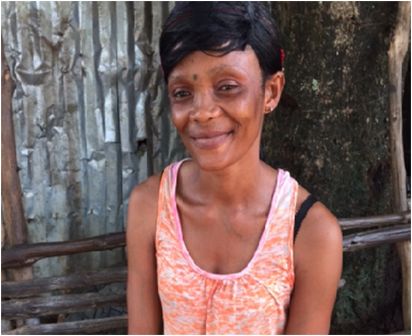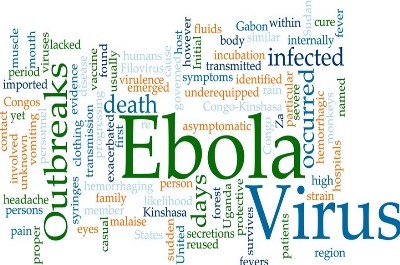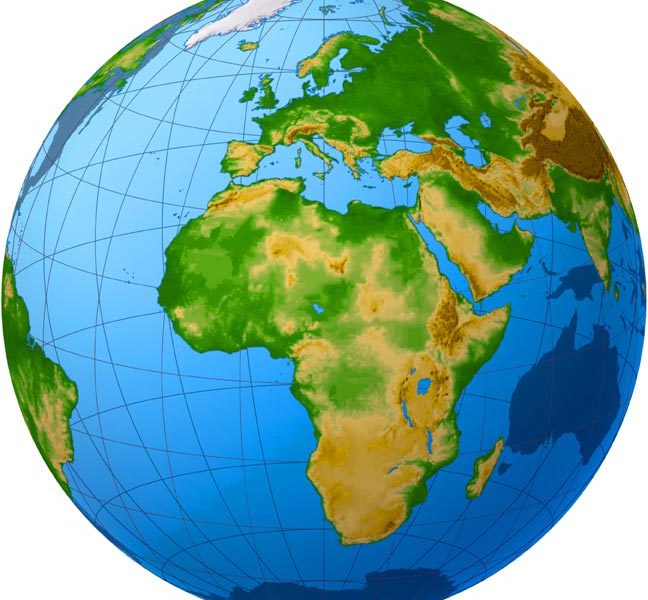A survivor’s Ebola revenge mission
Twenty-seven-year-old Bintu Massaquoi (in photo) was cheerfully narrating how she survived the Ebola virus disease until she was asked how much she missed her husband and her five-year-old child, both killed by the disease. Her mood suddenly changed. She paused, stared into the sky, and squeezed her eyes so tightly that tears flowed uncontrollably.
In a tone laced with anger and pity, she laments: “I will never forget what Ebola did to me.”
Ebola has been ruthless to this folksy and charismatic former athlete with seven national medals. Losing a husband and a child was devastating; having now to raise the remaining three children with little to survive on is salt to her emotional wounds.
But Bintu has been strong and stoic, and now she seeks revenge. “We must defeat Ebola in this fight,” she enthuses, with fists clenched. Bo district, where she resides, has been Ebola-free for more than 100 days, something she considers a partial victory. She hopes there is no recurrence in Bo district and that the virus is not anywhere in the country.
In the Ebola fight, Bintu’s formidable weapon is her testimony. “When I tell people my story — my infection, treatment and discharge from the hospital — they believe me. When I tell them about what to do to avoid Ebola, they understand.”
At motor parks, schools, markets, and around her neighbourhood, Bintu educates people daily on how to avoid Ebola.
Survivors played a critical role in bringing Ebola to an end in Bo district, says Maxwell Kemokai, a coordinator at Network Movement for Justice and Development (NMJD), a local non-government organization that engages Ebola survivors in response efforts.
Kemokai adds that between February and April 2015, 175 mobilizers, mostly survivors, promoted safe behaviours and explained Ebola by-laws in all of Bo’s 15 chiefdoms.
Under its Quick Impact Projects (QIPs), the United Nations Mission for Ebola Emergency Response (UNMEER) provided financial incentives to the mobilizers through NMJD.
UNMEER’s funding came at the right time, says Ann Kargbo, Programme Manager, Rehabilitation and Development Agency, Sierra Leone. Like NMJD, RADA was also involved in coordinating survivors’ participation in response work.
Bintu is the Public Relations Officer for the Bo district Ebola Survivors Association. She assists in organizing other survivors to engage in community sensitization.
Bintu’s husband, Mohamed and her son, Henry, died on the same day, on 3 November 2014. Both had gone to Freetown on vacation and stayed with her sister-in-law where Mohamed apparently got infected.
When Mohamed fell sick, he returned to Bo so that his wife could care for him. “I didn’t know a lot about Ebola at that time. I used to take my husband to the toilet and clean his vomit. At the same time, I prepared Henry for school,” recalls Bintu.
She called the emergency number when Mohamed’s and Henry’s conditions worsened. It was too late as they died a few days later. After that, Bintu began having a fever. “I knew it was Ebola and I thought I would die.”
Bintu’s neighbours vehemently refused to let her get in an ambulance. They feared that, like her husband and child, she would never return. “They brought a truckload of policemen and forcefully took me away. My neighbours were weeping, some of them even waved final goodbyes,” she says.
With hindsight, Bintu believes that going to the treatment centre that day saved her life. Her husband and son might have been saved if they had gone to the centre early enough.
The lesson from her situation is at the core of her message to others. “I tell people, if you have a fever or showing any Ebola symptoms, go quickly to the hospital for a check-up. Save yourself!”
Ebola’s horror show during November’s haywire days still haunts Bintu. “I can still remember the day that seven people died right in front of me.”
However, much progress has been made since last November. There is now more awareness about the virus, a lot more treatment facilities than there was last year, and numbers of new cases have dropped significantly.
In the week leading to 23 November 2014, for example, there were 383 new confirmed cases; in the week leading to 17 June 2015, there were just 14 new confirmed cases, underscoring that response efforts have paid dividends.
Despite such progress, Bintu insists there is still more work to do. “Unless the entire Sierra Leone is free of Ebola, no one of us should feel safe,” she says, with practised aplomb.
Bintu hopes to one day establish a hairdressing salon. She rolls eyes, dreamily, on the prospects of having to do her own business. “I will make money and provide a good life for my children.”
Until then, life is tough, as she depends on small stipends from her social mobilization work. “For now, I just want my kids to eat.” As Bintu talks about her children, she recollects fond memories of her late son. “Henry, Oh Henry!” Once again, tears flowed down her innocent face.
Credit UNMER Public Information Office
Stay with Sierra Express Media, for your trusted place in news!
© 2015, https:. All rights reserved.







AMOS
/
may GOD bless and protect all for life i pray salone will be Ebola free state again
3rd July 2015